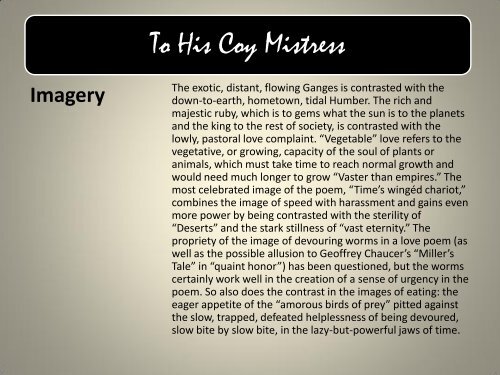Andrew Marvell: Metaphysical Poet
Andrew Marvell: Metaphysical Poet
Andrew Marvell: Metaphysical Poet
Create successful ePaper yourself
Turn your PDF publications into a flip-book with our unique Google optimized e-Paper software.
Imagery<br />
To His Coy Mistress<br />
The exotic, distant, flowing Ganges is contrasted with the<br />
down-to-earth, hometown, tidal Humber. The rich and<br />
majestic ruby, which is to gems what the sun is to the planets<br />
and the king to the rest of society, is contrasted with the<br />
lowly, pastoral love complaint. “Vegetable” love refers to the<br />
vegetative, or growing, capacity of the soul of plants or<br />
animals, which must take time to reach normal growth and<br />
would need much longer to grow “Vaster than empires.” The<br />
most celebrated image of the poem, “Time’s wingéd chariot,”<br />
combines the image of speed with harassment and gains even<br />
more power by being contrasted with the sterility of<br />
“Deserts” and the stark stillness of “vast eternity.” The<br />
propriety of the image of devouring worms in a love poem (as<br />
well as the possible allusion to Geoffrey Chaucer’s “Miller’s<br />
Tale” in “quaint honor”) has been questioned, but the worms<br />
certainly work well in the creation of a sense of urgency in the<br />
poem. So also does the contrast in the images of eating: the<br />
eager appetite of the “amorous birds of prey” pitted against<br />
the slow, trapped, defeated helplessness of being devoured,<br />
slow bite by slow bite, in the lazy-but-powerful jaws of time.


